Summer is soaring and the ‘King of Fruits’ has occupied its throne in Mysuru. Luscious mangoes have piled up in make-shift shops, carts, street corners and stalls at various junctions and prominent places. It is that time of the year when other fruits are sidelined and mango is placed on top of the fruit ladder. This Weekend Star Supplement profiles mango mania that has gripped the city and how sellers and buyers are making the most of the Golden Fruit.
Mysureans go gaga over Mangoes
By V. Shourabh
Mango is also apparently called the ‘Food of Gods’ in Vedas and is also a favourite among Mysureans. There is nothing in the world that can give you that immense pleasure of relishing mango in summer.
Though there have been chemical ways of ripening the fruit, Mysuru has gone the green and natural way. Several fruit sellers and farmers are using natural ways to ripen the luscious fruit.
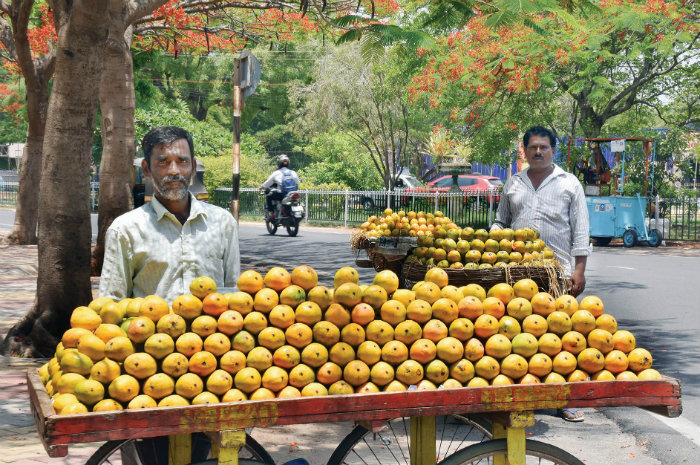
Summer is incomplete without mangoes. With just the mention of the word ‘summer’, the first thing that comes to our mind is the availability of varieties of mangoes. Mango markets and Mango Mandis are flooded with varieties of mangoes of various colours and taste. While some use raw mangoes to make pickles, others love the pulpy ripened ones and they are in for a treat this season. This soul soothing fruit is an all-time favourite.
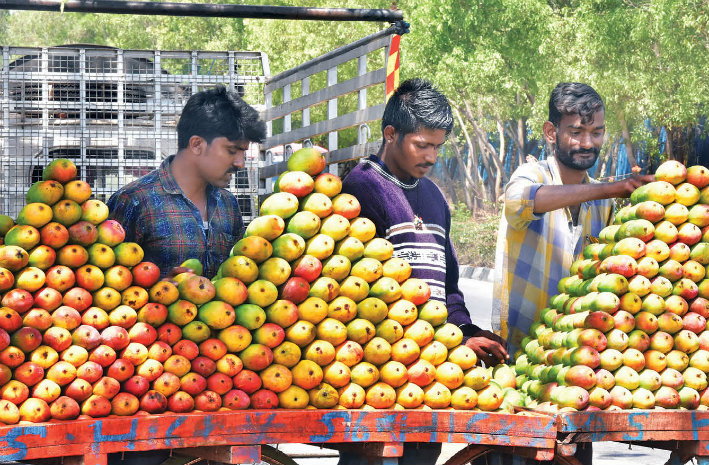
Highway Mango Mandi on Hunsur Road
Speeding cars and bikes slow down and buyers go for varieties of mangoes especially on the every-busy highway between Yelwal and Ankanahalli on the Mysuru-Hunsur Highway. This Highway Mango Mandi in that two-kilometre stretch starts from February every year and runs up to August. These mango sellers arrange varieties of mangoes in pyramid shapes and greet commuters, especially those going towards Madikeri. Obliging, people stop their vehicles and buy in bulk.
Akash, Kishore, Deepu, Preethu and Shivu have setup their own make-shift carts on that busy highway. Speaking to Star of Mysore, Kishore said, “In this two kilometre stretch, commuters stop by at one of the carts and buy fruit. They get tempted seeing so many mangoes and they buy for their family and friends and also stop by to have a bite or two.”
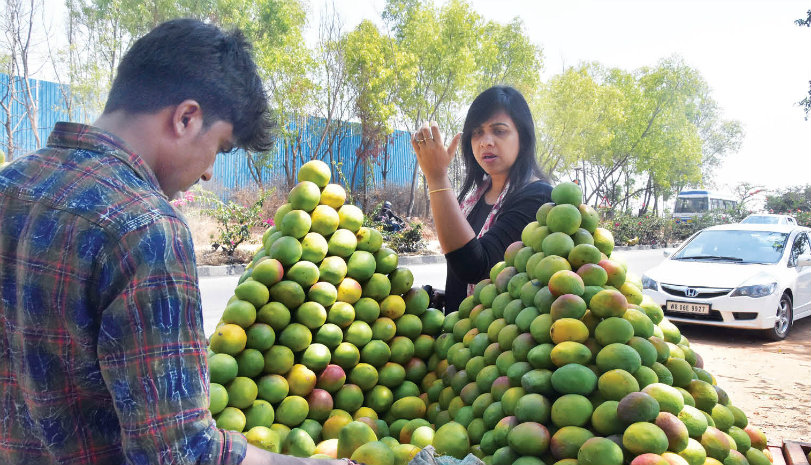
“I and my friends sell mangoes from February to July and we have varieties like Malagova, Badami, Apoos, Mundappa, Baganapalli, Kesari, Himapasha, Sakregulla, Kesari, Thotapuri, etc. All the mangoes sold here are natural which is grown nearby at Nagavala village,” he said.
Darshan, a 9th standard student, was enthusiastically selling mangoes by attracting customers by saluting and waving at vehicles. He said, “Being vacation time, I have shouldered the responsibility of selling mangoes here and support my family. This season gets us the most of the business. In other seasons our family sells other fruits but when we sell mangoes a lot of customers come in to buy it. All mangoes are procured from nearby villages — Nagavala, Bommanahalli, Seigalli, Vasaramanahalli, Kumarahalli, Ratnahalli, Benkipura, etc. I want to study and want to make the society more educated. That is why I intend to become a teacher.”
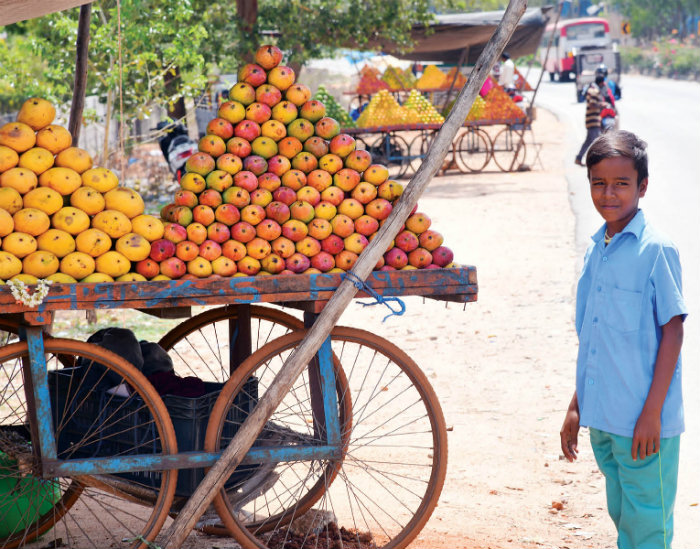
Another seller Lakshmanna was of the opinion that earlier only people passing through the highway used to buy mangoes but now people from Mysuru come all the way here to buy mangoes. He adds, “Since 10 years, I have been selling mangoes here and now the business has picked up. Apoos is the sweetest mango and that is all-time favourite.”
Madhu, a 10th Standard student sells mangoes with his grandfather Swaminayaka in a cart on the Hunsur Highway. He is inspired by his grandfather who has been selling mangoes since the last 60 years. Madhu said, “I intend to be as dedicated as my grandfather. Seeing him work hard makes me work harder. I want to join the Indian Army in the future.”
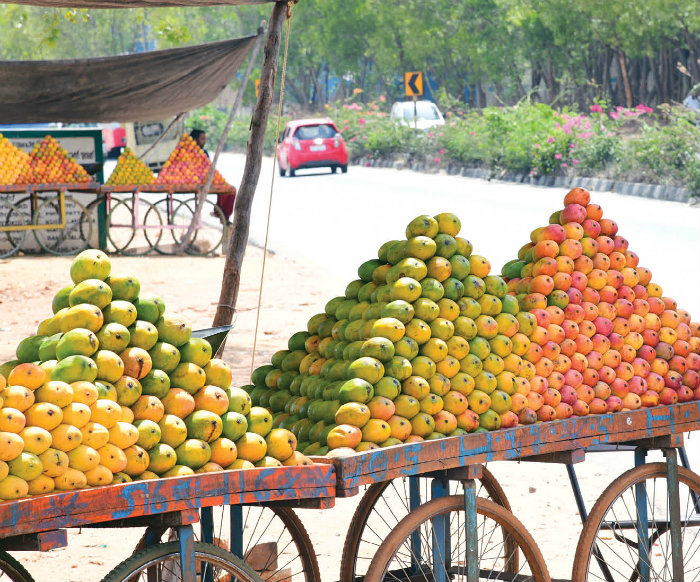
Mandis are the nerve centres for mangoes
The RMC Market near Bamboo Bazaar and APMC Market (mandis) are the central hub for fruits and being summer season, mangoes have been the central attraction. Here, mango merchants and dealers auction mangoes for commission. They buy mangoes from farmers, conduct auctions and the highest bidder gets the booty.
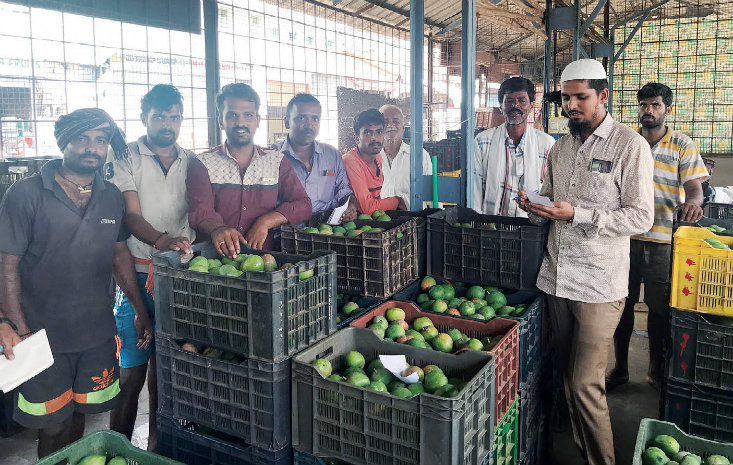
Mehboob Shariff, President, APMC Association, who is popularly known as Patthar Babu, opined that this year, lack of rains have hurt the mango yield in a major scale. In his shop M-Roshan Zameer RMS Fruits and Co. he auctions mangoes.
He said, “The crop yield is only 20% this year and it’s a 60% slump compared to the previous year. This has been a major concern. We conduct auctions daily and generally it happens in the early hours of the day. A lot of sellers swell in the morning and take part in the auctions.”
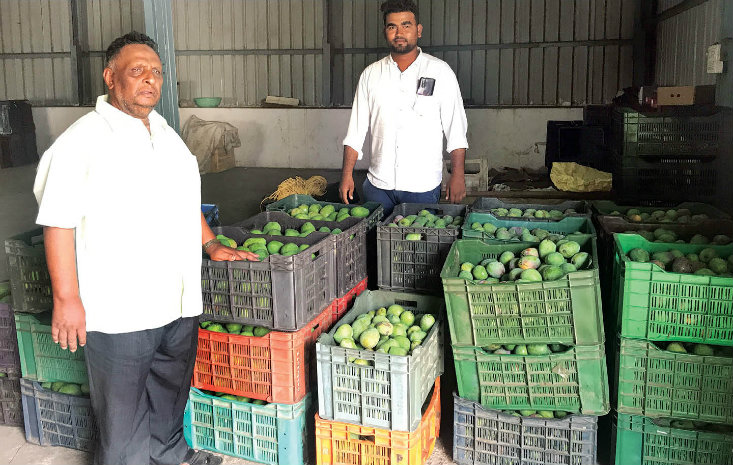
Mohiyuddhen, Proprietor, HMI Fruits and Co, said, “We get mangoes in crates and the auction is a systematic process. The highest bidder gets the fruit and for every variety of mangoes there is a base auction price and a maximum auction price. Alphonso has a range of Rs.30-70/kg, Rasapuri Rs.20-60/Kg, Malagova Rs.20-60, Mallika Rs.25-60 etc. We get mangoes from K.R. Pet, Mandya and nearby villages. We also send crates of mangoes to other companies who make pulp and juice,” he said.
“We sell fruits to companies like Jain Irrigation, Mother Dairy Ice Cream factory in Bengaluru, pulp factories in Chittoor, Ahmedabad, and Krishnagiri etc. They use it for making juice pulps and syrups. We also send it to the Coco-Cola factory. Daily we auction about 400-500 crates to local fruit sellers and later during the day we also sell about 50-100 tonnes of mango pulp to factories,” he added.
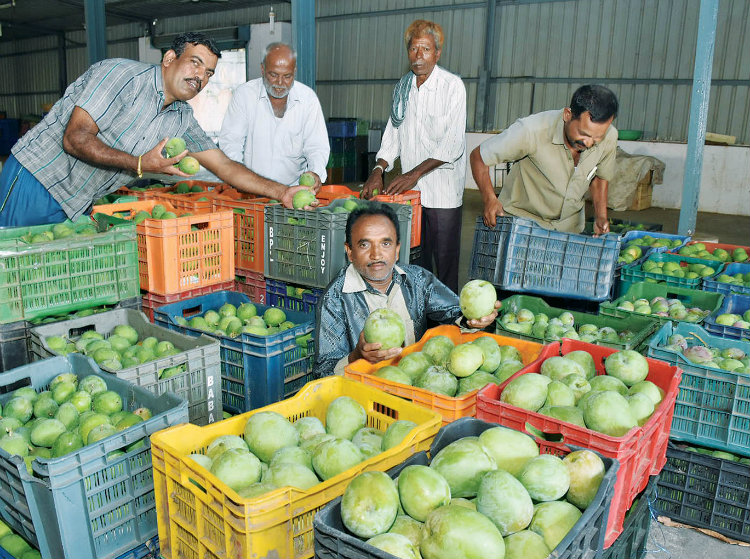
Akbar Road Mango Bazaar
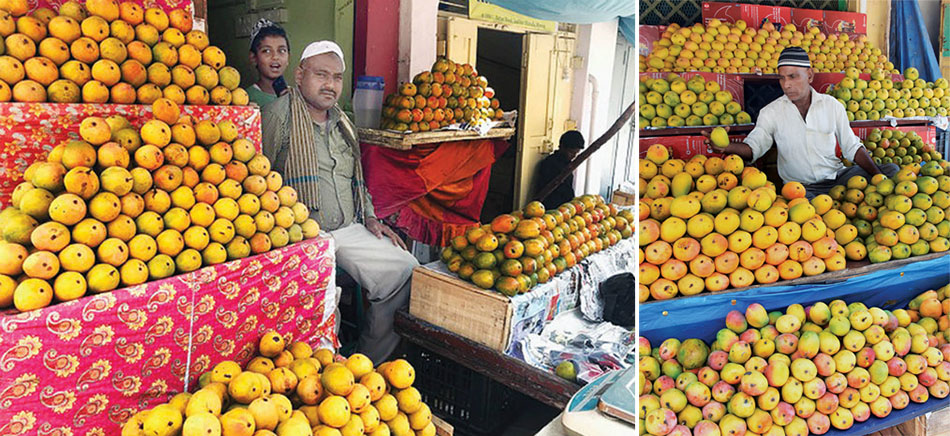
Natural Mango Ripening Centre at Hebbal
C.M. Subramanian runs Goldline Industries and supplies fruits and vegetables to major hotels like Radisson Blu Plaza, Metropole and Southern Star. He has come out with an innovative ripening method and setup the facility at Hebbal for ripening fruits in a natural and a healthy way. Most of the fruits are ripened using chemicals like carbide powder. He says, “Customers get fooled by seeing the colour of the fruit. Carbide powder ripens the fruit overnight and is very harmful as it is a cancer-causing chemical.”
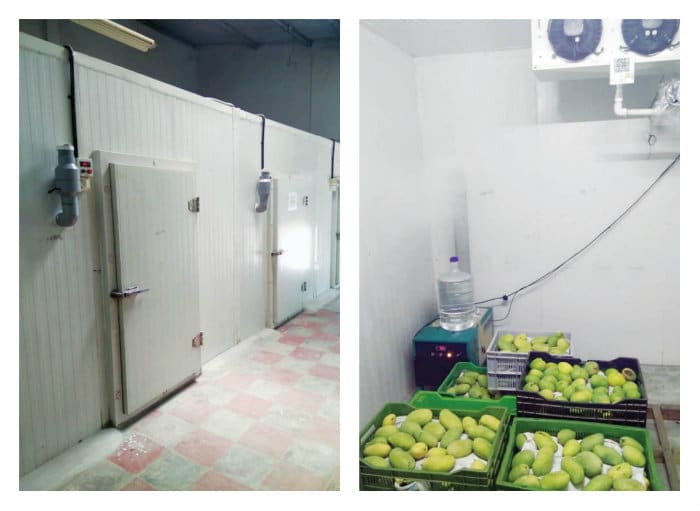
He has setup a chamber where the fruits are placed in crates. Ethylene gas is released in the closed cold chamber. This gas is naturally available in the atmosphere and it helps ripen the fruit. The temperature inside the cold chamber is maintained between 20 to 22 degree Celsius and a low dosage of ethylene gas is sprayed.
After the first 24 hours, the ripening process begins. This process is just like respiration. Mangoes are exposed to Ethylene gas and it releases carbon dioxide, which comes out of the chamber through an exhaust pipe. Once in every 12 hours carbon dioxide is let out. On the fourth day, mangoes are fully ripe. Along with temperature, the setup has a humidity control mechanism. It is essential that the fruit remains moist and thus a humidity control meter is placed to monitor it, he says.

Subramanian adds, “I also keep updating myself to the latest technology and methods. This setup will cost around 10 lakh for a chamber that can hold 4 tonnes of fruits. This process of ripening is safe and naturally induced.”



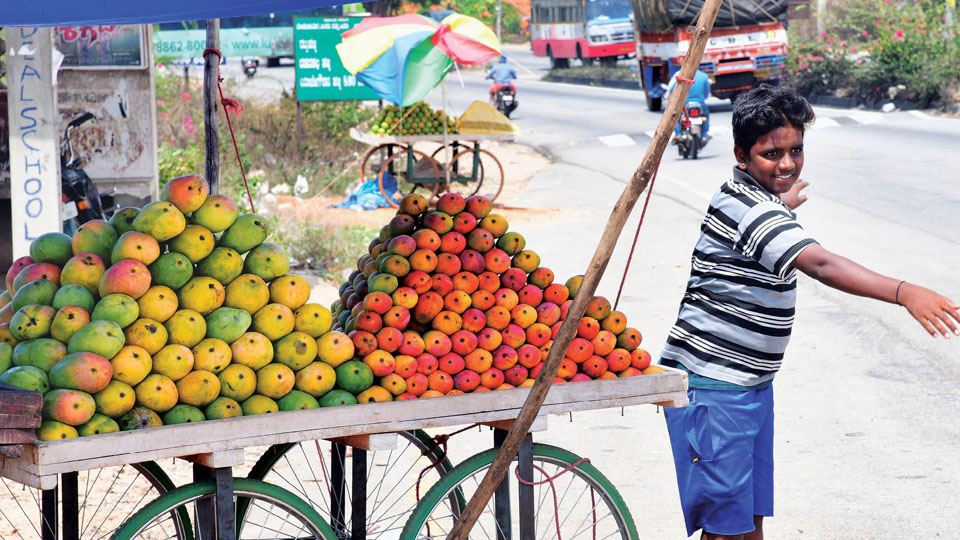

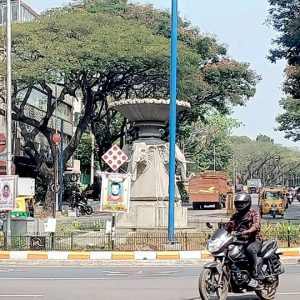

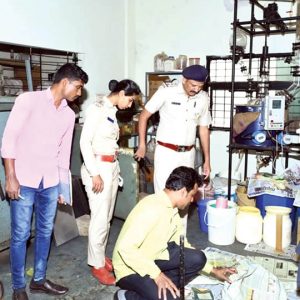
Recent Comments